Jeff Sessions' Pot Crackdown Shows Yet Again Republicans Only Care About States’ Rights When It Serves Them
To hear many Republicans tell it, protecting states’ rights is a cornerstone of their philosophy.
“States’ rights” was the rallying cry of Republican governors challenging the constitutionality of the Affordable Care Act in 2010, and it was the animating ideal behind President Donald Trump’s decision this week to reduce the size of two federal monuments in Utah.
When state governments enact progressive policies at odds with Republicans’ national agenda, however, national GOP leaders do not hesitate to run roughshod over their supposedly cherished federalist principles.
That has been true for some time. But with Republican power in Washington, D.C., arguably at its highest point since the 1920s, the disparity between GOP rhetoric and actions on states’ rights is coming into sharper relief.
President Trump’s administration and congressional Republicans have used a number of tools to limit the ability of more liberal “blue states” to advance their progressive agendas, including, but not exclusively, a Justice Department crackdown on states that have legalized marijuana, the Republican tax overhaul, a concealed-carry gun law making its way through Congress, an attempt to undermine states that restrict law enforcement’s use of civil asset forfeiture, and efforts to bar state-level single-payer health care.
“They’re practicing situation ethics. They believe in states’ rights when it serves their cause and they don’t when it doesn’t,” said Bill Galston, a senior fellow at the Brookings Institution, a nonpartisan think tank.
Gary Gerstle, a historian of American politics at the University of Cambridge, likewise described the approach as “opportunistic.”
“Their principal goal is to subdue and dismantle the welfare state,” and defending states’ rights is sometimes a means to that end, Gerstle argued. “Once states are no longer useful to them, in terms of their ambitions, they will quickly abandon their commitment to states’ rights.”
Open Season On States With Legal Marijuana
Attorney General Jeff Sessions’ hostility to marijuana is no secret. In March, he described the non-lethal drug as “only slightly less awful than heroin,” which puzzled those Americans under the impression that marijuana’s most notorious side effects are increased appetite and dry mouth.
On Jan. 4, Sessions finally did something about it, announcing that the Justice Department was releasing federal prosecutors to enforce the national marijuana ban in the 29 states that have legalized some form of medical or recreational marijuana use. The measure reverses an Obama administration policy that effectively shielded those states from federal prosecution of state-legal acts.
In addition to the policy implications of Sessions’ move, including the uncertainty it will inject into the nascent legal marijuana industry, his action makes a mockery of the states’ rights principle.
“For folks who’ve always advocated states’ rights and the 10th Amendment, it runs pretty counter to that core belief,” Sen. Mark Warner (D-Va.) told HuffPost on Thursday.
The Tax Overhaul’s ‘Targeted Assault’ On Blue States
Of all the Republican efforts to undermine progressive state policies, the tax cut legislation stands out for how brazen and far-reaching it is. The new law will almost entirely eliminate the federal income tax deduction for state and local taxes in order to help pay for massive tax cuts for corporations and super-rich individuals.
The provision hits a handful of liberal states with their own higher taxes especially hard, since they are the only places where state and local taxes are high enough for a significant number of taxpayers to take advantage of the federal deduction. The upper-middle-class taxpayers in those states, who were most likely to use the deduction, will now not only pay taxes for schools and social services in their states; they will also pay federal income taxes on almost all of the money they have paid in state and local taxes as if it were ordinary income.
Norm Ornstein, a congressional expert at the conservative American Enterprise Institute, described the provision as a form of “double taxation,” since blue-state taxpayers would effectively be taxed by the federal government on income they have already been taxed on at the state and local levels.
“It is a crippling thing for states and it is of no concern for members of Congress who talk a lot about states’ rights,” he said.
Currently, liberal states like New York, California, New Jersey, Maryland, Massachusetts and Connecticut use higher taxes to finance unionized public sector workforces, robust public universities and more generous social safety net programs than many of their counterparts across the country. There is evidence linking these policies to higher average living standards for state residents, including metrics like life expectancy at birth.
But eliminating state and local deductions from federal income taxes will make it much harder politically for blue states to continue levying the taxes on higher-earning residents that allow them to fund social programs.
That’s why blue-state lawmakers from both parties offered some of the most vocal criticism of the tax bill prior to its passage. New York Gov. Andrew Cuomo (D) called the provision a “targeted assault” on New York, and 12 out of 13 of the GOP House members who voted against the legislation hailed from either California, New York or New Jersey.
Meanwhile, Republican lawmakers like Sen. Ted Cruz (R-Texas) have been upfront about the fact that they see the measure as a way to pressure liberal states to lower their taxes ― and by extension, reduce their public spending. And a convenient byproduct of undermining states’ budgets is the weakening of public sector unions, major sources of funding and support for Democratic politicians.
“One of the classic definitions of justice ... is doing good to your friends and harm to your enemies,” Galston said. “It is pretty clear to me that Republicans have used that strategy in the tax bill. Some of them have been quite frank about it.”
Using tax legislation to exact political retaliation against liberal states “is the sort of thing you tend to see in an authoritarian government, not in a representative government,” said Ornstein, a co-author of the book It’s Even Worse Than It Looks: How the American Constitutional System Collided with the New Politics of Extremism.
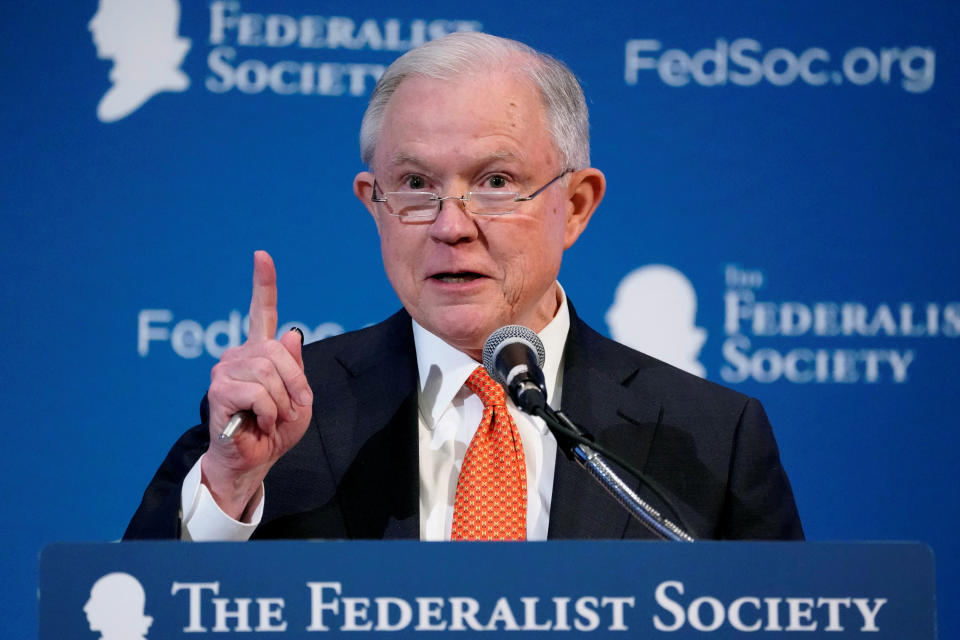
Overriding Gun Control Laws
The House of Representatives will soon vote on a bill that would require all states to recognize the concealed-carry gun permits granted in other states. If enacted, the Concealed Carry Reciprocity Act would force states with strict gun laws like New York, New Jersey and California to accept concealed-carry permits granted in states with looser regulations. It would even require them to honor the concealed-carriage rights of residents of 12 states where no permit is required at all to legally carry a concealed weapon.
The bill passed the House in early December by a 231–198 vote. Six Democrats voted for the legislation, while 14 Republicans voted against it.
The American Enterprise Institute’s Ornstein called the bill a “middle finger to the states” that essentially says, “We don’t care what you want to do in your own state. We don’t care what your laws are. We care about the NRA.”
“That tells you what the fealty to states’ rights is here. It’s an empty slogan,” added Ornstein.
There is no shortage of other examples of Republican attempts to undercut liberal states since Trump’s election. In September, Sen. John Kennedy (R-La.) tried to add an amendment to a bill repealing key components of the Affordable Care Act that would have forbidden states from setting up single-payer health systems of the kind gaining momentum in California.
When asked whether the provision conflicted with his professed commitment to states’ rights, Kennedy told HuffPost’s Jen Bendery, “I believe the United States Congress has a legal and a moral obligation to, on occasion, set down national rules.”
For his part, Attorney General Sessions has sought to limit more progressive states’ ability to reform civil asset forfeiture, a practice in which law enforcement has broad discretion to seize the cash or other assets of alleged criminals without the need for a conviction.
The practice has drawn bipartisan criticism, prompting 13 states ― including Nebraska and New Mexico ― to limit the use of civil asset forfeiture to cases where there is already a criminal conviction.
To avoid the new state laws, law enforcement agencies took advantage of a loophole known as “adoption,” in which a local law enforcement body invites the participation of a federal agency, however nominal, and is thus subject to the more lenient federal regulations on civil asset forfeiture. The Obama administration was in the process of phasing out the “adoption” loophole in states that had passed tougher regulations, but now Sessions has reversed his predecessor’s policy.
“Just to be clear about what this would do: Sessions wants to force federal forfeiture law onto states whose legislatures have explicitly rejected it,” civil libertarian Radley Balko wrote in an opinion column in The Washington Post.
Jon Thompson, communications director for the Republican Governors Association, tried to downplay the degree to which Republicans have professed to care about states’ rights.
“I don’t know if I would classify Republicans as claiming the mantle of states’ rights,” Thompson said in an email. “You hear a lot about states’ rights from Republican governors because there are so many of them, with 34, while Dems only have 15.”
In a way, Thompson is right. Republicans have a long history of undermining states’ rights when that aligns with other priorities, several experts told HuffPost. For example, some conservative legal scholars supportive of Republican causes have argued that more lenient federal rules should “pre-empt” more progressive state environmental, labor and consumer regulations.
Even the classic conservative reform idea of allowing health insurers to sell coverage “across state lines” would effectively nullify state regulations in favor of a uniform federal standard, noted Galston.
Now that the Republican Party has become even more hostile to government intervention to address social ills at the same time it enjoys unified control of the federal government, GOP leaders are simply making up for lost time, the University of Cambridge’s Gerstle posited.
“They see this as their moment. They have more power in Washington now than at any time since the 1920s,” Gerstle said. “They realize that their window may be brief and they want to use it for anything they can.”
Also on HuffPost
Love HuffPost? Become a founding member of HuffPost Plus today.
Taking Security Seriously
With Liberty And Justice...
Whispers
Not Throwing Away His Shot

Medicare For All

Bernie Bros
McCain Appearance
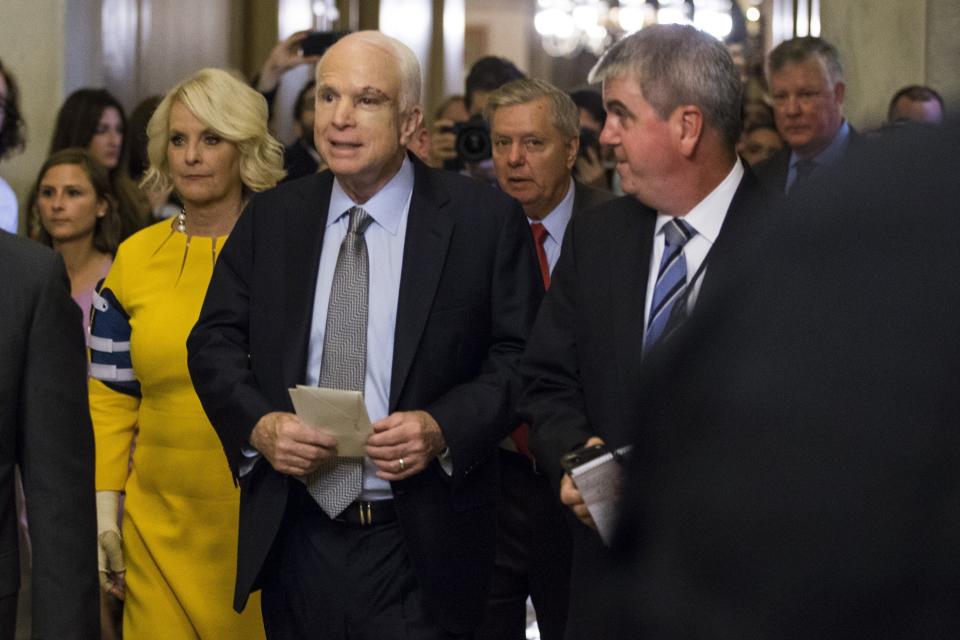
A Narrow Win
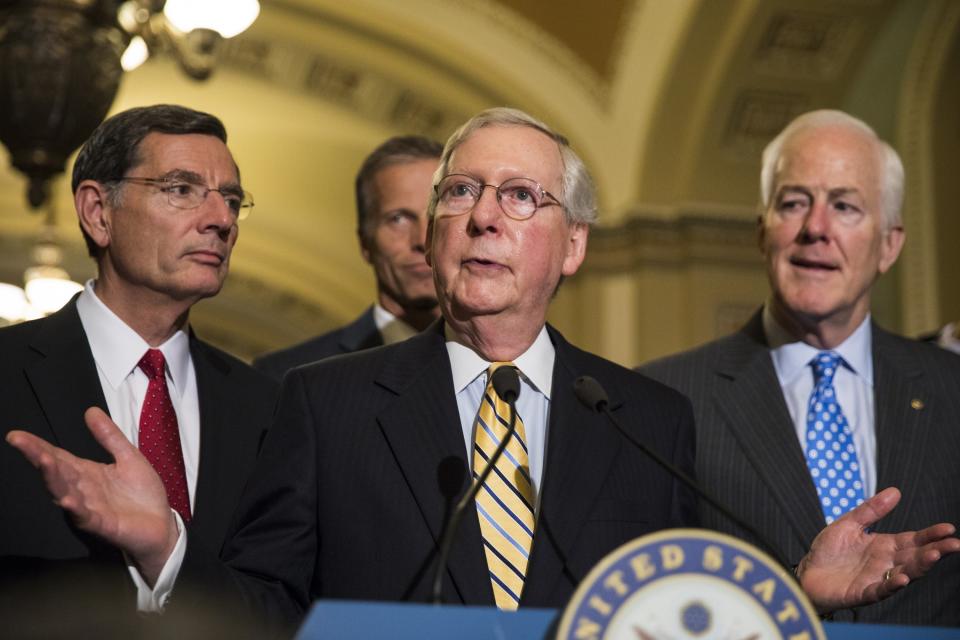
Kushner Questioning

Hot Dogs On The Hill

And Their Veggie Counterparts

Poised For Questions

Speaking Up

In The Fray

Anticipation
Up In Arms

Across A Table
Somber Day

Family Matters

A Bipartisan Pause

Hats On

Public Testimony

Comey's Big Day
Conveying His Point
Selfie Time
Budget Queries

Flagged Down By Reporters

Shock And Awe

Seeing Double

Honoring Officers

Whispers

Skeptical
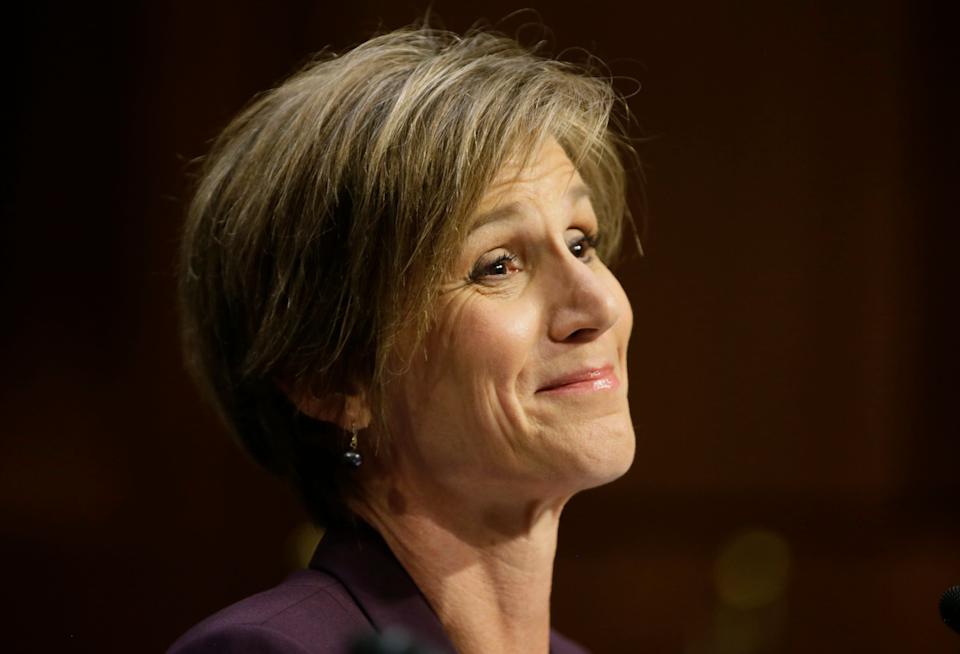
Differing Opinions
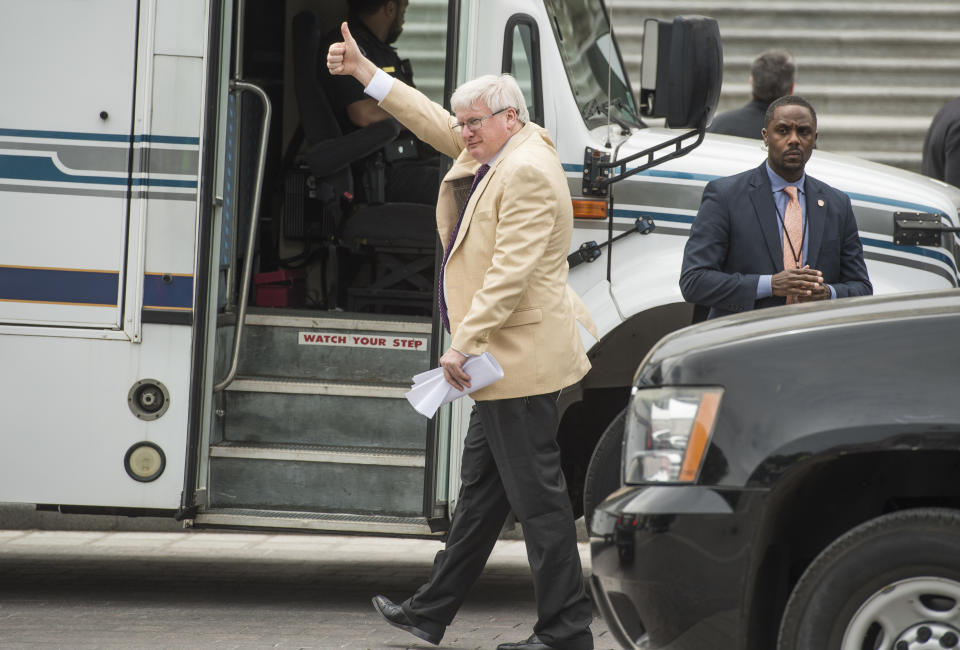
Real Talk

In Support Of Immigrants
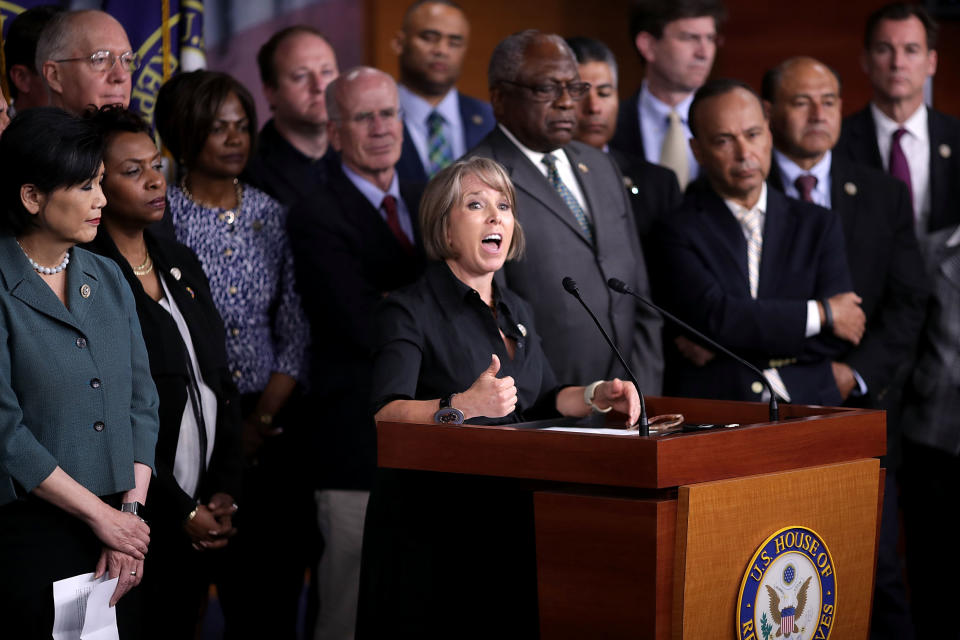
This article originally appeared on HuffPost.

